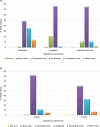A 15-year review of the Stanford Internal Medicine Residency Program: predictors of resident satisfaction and dissatisfaction
- PMID: 28814910
- PMCID: PMC5546589
- DOI: 10.2147/AMEP.S138467
A 15-year review of the Stanford Internal Medicine Residency Program: predictors of resident satisfaction and dissatisfaction
Abstract
Introduction: Satisfaction with training and with educational experiences represents important internal medicine (IM) programmatic goals. Graduates from IM residency programs are uniquely poised to provide insights into their educational and training experiences and to assess whether these experiences were satisfactory and relevant to their current employment.
Methods: We surveyed former IM residents from the training program held during the years 2000-2015 at the Department of Medicine, Stanford University. The first part of the survey reviewed the IM residency program and the second part sought identifying data regarding gender, race, ethnicity, work, relationships, and financial matters. The primary outcome was satisfaction with the residency experience.
Results: Of the 405 individuals who completed the Stanford IM residency program in the study period, we identified 384 (95%) former residents with a known email address. Two hundred and one (52%) former residents responded to the first part and 185 (48%) answered both the parts of the survey. The mean age of the respondents was 36.9 years; 44% were female and the mean time from IM residency was 6.1 (±4.3) years. Fifty-eight percent reported extreme satisfaction with their IM residency experience. Predictors associated with being less than extremely satisfied included insufficient outpatient experience, insufficient international experience, insufficient clinical research experience, and insufficient time spent with family and peers.
Conclusion: The residents expressed an overall high satisfaction rate with their IM training. The survey results provided insights for improving satisfaction with IM residency training that includes diversifying and broadening IM training experiences.
Keywords: internal medicine residency program; residents; training.
Conflict of interest statement
Disclosure The authors report no conflicts of interest in this work.
Figures


Comment in
-
Additional factors influencing resident satisfaction and dissatisfaction.Adv Med Educ Pract. 2017 Nov 10;8:769-770. doi: 10.2147/AMEP.S150702. eCollection 2017. Adv Med Educ Pract. 2017. PMID: 29184461 Free PMC article. No abstract available.
References
-
- ACGME . Program Requirements for Graduate Medical Education in Internal Medicine. ACGME; 2017. [Accessed July 19, 2017]. Available from: http://www.acgme.org/Portals/0/PDFs/ab_ACGMEPoliciesProcedures.pdf.
-
- Frohna JG, Melgar T, Mueller C, Borden S. Internal medicine-pediatrics residency training: current program trends and outcomes. Acad Med. 2004;79:591–596. - PubMed
-
- Baldwin DC, Jr, Daugherty SR, Ryan PM, Yaghmour NA. What do residents do when not working or sleeping? A multispecialty survey of 36 residency programs. Acad Med. 2012;87:395–402. - PubMed
Grants and funding
LinkOut - more resources
Full Text Sources
Other Literature Sources

